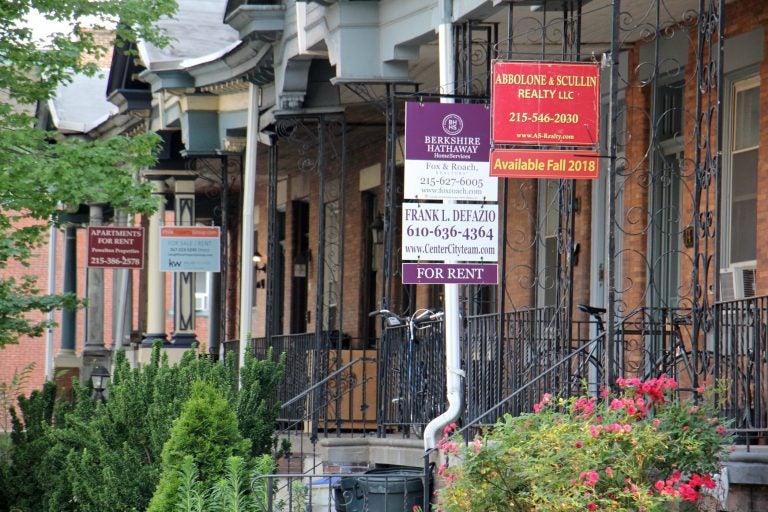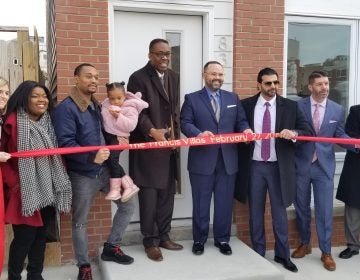Philly officials to face Council scrutiny on faulty property assessments
Philadelphia’s Office of Property Assessment faces scrutiny from City Council over audits finding inaccurate property value assessments.

Rowhomes at 34th and Spring Garden Street for sale or rent. (Emma Lee/WHYY)
This story originally appeared on PlanPhilly.
—
This afternoon an extremely wonky fight over how Philadelphia assesses property values is going to take center stage in City Hall.
Since the beginning of 2019, two audits have shown flaws in the methods of the city’s Office of Property Assessment (OPA). Last year, during Philly’s first citywide residential property reassessment since 2013, many homeowners were surprised to see their property values skyrocket — and property taxes along with them — while their neighbors on the same block saw totally different outcomes.
“There are clearly irregularities with assessments,” City Council President Darrell Clarke told reporters during an early January unveiling of City Council’s audit of the OPA. “We promised people…that we would have a fair and equitable tax system. But we clearly have some challenges.”
The hearing of Council’s Legislative Oversight Committee, chaired by Councilman Kenyatta Johnson, is meant to draw more public attention to the Council audit and a subsequent audit released by City Controller Rebecca Rhynhart’s office. Witnesses will include the head of OPA, Michael Piper, Rhynhart herself, and two expert appraisers.
For those seeking to attend the hearings, here’s what to expect Councilmembers to question Piper about.
Council’s audit showed that there were large swathes of the city where the city’s assessments are off by at least 15 percent. (The report didn’t distinguish between those that were overassessed or underassessed, and just showed that they were inaccurate.) It also found that OPA’s methodologies were opaque and not available to the public, making it hard for property owners or other outside observers to determine where the agency went wrong.
Both Council’s audit and the Controller’s audit found that OPA’s assessments of land value were especially problematic, which is troubling because land in the same general area is usually priced similarly. (Property values are assessed by combining the worth of the land and the building, which have more variable prices because they can differ in size, unit count, and amenities.)
“The land value assessments have actually gotten more broken over the last few years,” said Rhynhart. “That means you can have two houses right next to each other with the same square footage, but the land value per square foot could differ as much as $20 a square foot.”
The controller’s report states that before tax year 2017, OPA relied on Drexel University economist Kevin Gillen to provide land value estimates. But in the recent citywide residential assessment, they relied on a different method that the controller believes based the land value on a fixed percentage of a building’s worth.
Rhynhart’s office argues this apparent change distorted outcomes, particularly for property owners who enjoy the 10-year property tax abatement. Most owners would not have noticed the difference in their land assessments, because some value simply shifted from the building to the ground it sat on. But the abatement does not apply to land values, so the OPA’s new method of calculation eked more property tax dollars out of abated properties.
The controller’s audit differed from Council’s in that it found that the “more regressive and less uniform” assessments could be found in lowest income city neighborhoods, specifically in North, West, and Southwest Philadelphia. Rhynhart says this disparity is especially troubling, potentially overburdening those least able to afford it.
“When you look at it by neighborhood, the city is actually giving the most inaccurate assessments to the poorest neighborhoods in the city,” Rhynhart said.
The Kenney administration agrees that last year’s citywide residential assessment was problematic and that the office needs some reforms. But they argue that there has been a marked improvement in the agency’s performance in recent years and that the city’s tax assessment apparatus is far more professionalized and fair than it had been before.
The OPA is a relatively new agency, a 2010 creation of Mayor Michael Nutter’s administration. Formed as a replacement for the scandal-plagued Bureau of Revision of Taxes, the Kenney administration argues that the OPA’s performance is getting better despite the continued issues. (The controller’s audit does allow that “the OPA’s assessments have improved year over year.”)
“The OPA and the method of property assessment in Philadelphia have come along way since the days of [Mayor Nutter],” said Dunn. “But we agree that there is room for improvement.”
Dunn also notes that some of the backlash from the increased assessments could be rooted in Philadelphia’s newly-robust real estate market. Neighborhoods where values stagnated for decades have seen sudden price surges, and that reforming OPA may not be enough to assuage concerns. That’s why it is important that Council and the mayor’s office continue to tinker with the city’s robust array of tax relief programs.
“The Office of Property Assessment has one important task and that’s to ensure property values reflect market values,” said Dunn. “[But] The admin[istration] is committed to working with Council to discuss any tax policy changes that could help alleviate concerns that do arise as property values appreciate in a strong market.”
Despite Kenney’s team criticism of some aspects of the audits, they agreed that changes are needed especially to make the agency calculation more transparent. The oft-delayed CAMA (Computer Assisted Mass Appraisal) system, which is expected to be a huge boon to the effort. The administration calls for more staff to bring the agency up to speed as well.
The Kenney administration promised to delay further citywide assessments until reforms have been implemented. But there will still be a more limited assessment based on market conditions.
Today’s hearing will be the first time that OPA chief Michael Piper will face Councilmembers in public since the audits. Council President Clarke called for his replacement at the head of OPA, saying that the results of Council’s investigation show that a leadership shakeup is needed.
The administration argued that punishing Piper, or any other OPA staff, would be unnecessary.
Unlike most city agencies, the head of OPA does not just need mayoral approval to be seated. When the agency was created in 2010, Council gave itself veto power over OPA leadership. When Mayor Kenney called for a new four-year term for Piper last spring, however, no City Councilmember introduced the necessary legislation.
WHYY is your source for fact-based, in-depth journalism and information. As a nonprofit organization, we rely on financial support from readers like you. Please give today.






